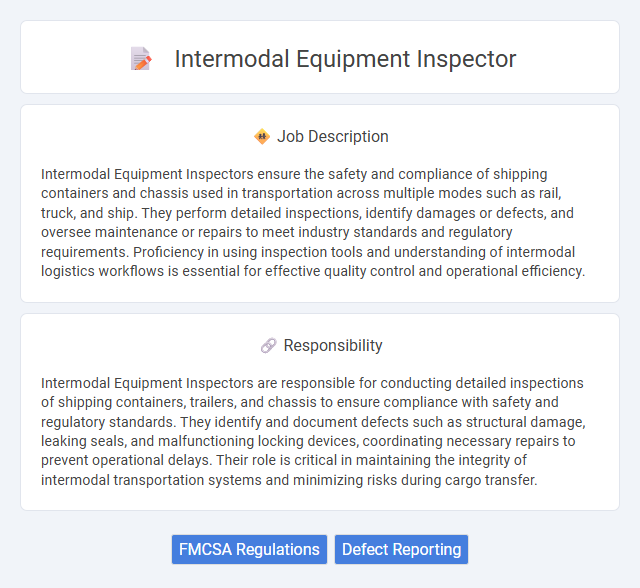
Intermodal Equipment Inspectors ensure the safety and compliance of shipping containers and chassis used in transportation across multiple modes such as rail, truck, and ship. They perform detailed inspections, identify damages or defects, and oversee maintenance or repairs to meet industry standards and regulatory requirements. Proficiency in using inspection tools and understanding of intermodal logistics workflows is essential for effective quality control and operational efficiency.
Individuals who demonstrate strong attention to detail and physical stamina are more likely to be suitable for an Intermodal Equipment Inspector role. Those with a tendency toward meticulous observation and safety consciousness probably fit well, as the job involves assessing the condition of containers and trailers to prevent logistical issues. People who find routine inspections engaging and can handle outdoor work conditions have a higher probability of thriving in this position.
Qualification
Intermodal Equipment Inspectors require a strong understanding of container and chassis inspection protocols, typically supported by certifications such as the Certified International Container Inspector (CICI) or equivalent industry credentials. Proficiency in identifying structural damages, seal integrity, and safety compliance according to ISO standards and industry regulations is essential. Candidates should possess excellent attention to detail, knowledge of transportation logistics, and the ability to use inspection technologies and software for accurate reporting and maintenance scheduling.
Responsibility
Intermodal Equipment Inspectors are responsible for conducting detailed inspections of shipping containers, trailers, and chassis to ensure compliance with safety and regulatory standards. They identify and document defects such as structural damage, leaking seals, and malfunctioning locking devices, coordinating necessary repairs to prevent operational delays. Their role is critical in maintaining the integrity of intermodal transportation systems and minimizing risks during cargo transfer.
Benefit
Working as an Intermodal Equipment Inspector likely offers the benefit of ensuring safety and efficiency in transportation, which can lead to a strong sense of job security. Opportunities for skill development in inspection techniques and regulatory compliance may be available, enhancing career growth potential. The role probably includes structured work hours and the possibility of overtime pay, contributing to stable income.
Challenge
Intermodal Equipment Inspectors likely face the challenge of accurately assessing diverse and complex containers under strict safety and regulatory standards, which requires detailed knowledge and vigilance. Managing time efficiently while ensuring thorough inspections can present ongoing difficulties. Navigating fluctuating workloads and unexpected mechanical issues may increase the complexity of the role.
Career Advancement
Intermodal Equipment Inspectors play a crucial role in ensuring the safety and functionality of containers used in global shipping, offering a foundational position within the logistics and transportation industry. Career advancement opportunities frequently include moving into supervisory roles, quality control management, or compliance specialists, leveraging expertise in equipment standards and regulatory requirements. Professional development can be accelerated through certifications such as Certified Welding Inspector (CWI) or Hazardous Materials Endorsement, enhancing prospects for higher salaries and leadership positions.
Key Terms
FMCSA Regulations
Intermodal Equipment Inspectors ensure compliance with FMCSA regulations by conducting thorough inspections of trailers, containers, and chassis used in intermodal transport to maintain safety standards and prevent violations. They verify brake systems, tire conditions, lighting, and securement devices in accordance with FMCSA Parts 393 and 396 requirements. Accurate documentation and reporting of inspection results support regulatory adherence and facilitate safe highway operations.
Defect Reporting
Intermodal Equipment Inspectors perform thorough defect reporting to identify and document damages or malfunctions in containers, chassis, and trailers, ensuring compliance with safety standards. Accurate defect reports facilitate timely repairs and maintenance, minimizing operational disruptions and enhancing cargo safety. Detailed inspection records support regulatory audits and improve asset longevity within intermodal transportation systems.
 kuljobs.com
kuljobs.com